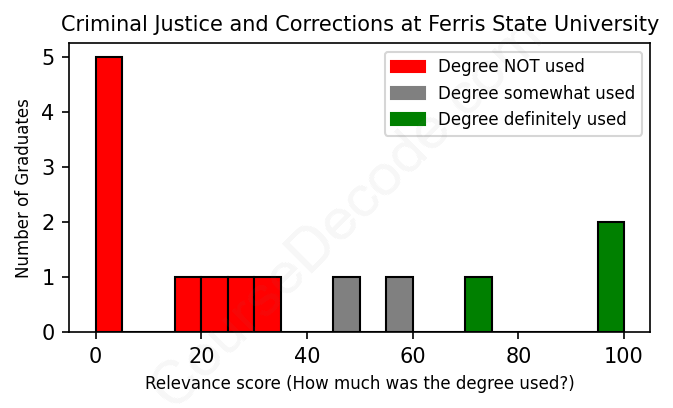
First, some facts. Of the Criminal Justice and Corrections graduates from Ferris State University we've analyzed , here's how many have used (or NOT used) their degree in their career:

These are estimates based on AI analysis of 14 LinkedIn profiles (see below).
The verdict? Horrible! Overall, with an average relevance score of 34%, Criminal Justice and Corrections graduates from Ferris State University have an exceptionally lower likelihood (-33%) of finding work in this field compared to the average graduate across all fields:
And for comparison, here's the chart for all profiles we've looked at across all degrees.
Also, after graduating, only 28% of these graduates have pursued further education other than another Bachelor's degree (such as a Masters degree or other), compared to the average across all profiles of 35%. This suggests a Bachelors degree is enough for most Criminal Justice and Corrections graduates, and it's normal to look for work straight after graduation.
See the details:
|
Relevance score: 0% We think this person has NOT gone into a career related to their degree. We think this person has NOT gone into a career related to their degree.
DEGREE INFOGraduated in 2012 from Ferris State University with a Bachelor of Applied Science (B.A.Sc.) in Criminal Justice and Corrections. No other secondary education since. JOB HISTORY SINCE GRADUATIONPrimary Lead Max and Erma's Restaurants Feb 2013 - Apr 2014 Heart of the House Supervisor  The Rusty Bucket Restaurant and Tavern Apr 2014 - Present ABOUTIn my downtime, I enjoy hunting and fishing. Also, given the opportunity, I like to kayak, canoe, hike, mountain bike and bowling. Hockey and Lacrosse are two of my passions that I do partake in currently. I am recently becoming more active in the gym and hope to be optimal shape by this summer. |
The top 10 most common jobs done by the graduates we've analyzed (ranked most common to least) are:
Looking at the job paths of graduates from Ferris State University with a degree in Criminal Justice and Corrections, it’s clear that there’s a mix of related and unrelated jobs out there. A lot of these grads ended up in positions like restaurant management, tree trimming, and financial roles, which don’t really connect to the skills and knowledge they gained in their studies. For example, many took on roles such as Primary Lead at a restaurant or worked as an accountant at an embassy. These jobs may be solid career choices, but they certainly don’t tap into the heart of criminal justice or corrections, like understanding laws, managing offenders, or contributing to public safety.
On the flip side, there are some standout roles that do align perfectly with their degree. Positions like Probation Officer, Foster Care Case Manager, and Surveillance Officer show that when these graduates used their degree-specific skills, they thrived in fields related to criminal justice and child welfare. These roles highlight the potential for meaningful careers within the system, tackling everything from supervising offenders to working with at-risk youth. So, while many grads took detours into unrelated fields, there certainly are some who found their niche in the core areas of criminal justice and corrections, proving that the degree can lead to impactful work when applied in the right places.
Here is a visual representation of the most common words in job titles for Criminal Justice and Corrections graduates (this is across all Criminal Justice and Corrections graduates we've analyzed, not just those who went to Ferris State University):

The career trajectories of graduates from Ferris State University’s Criminal Justice and Corrections program seem to vary quite a bit, particularly in their early jobs after graduating. Many of the alumni ended up in roles that don't necessarily align with their degrees, like restaurant supervisors, tree trimmers, or customer service positions. For those who jumped straight into the field, positions like probation officer or case manager appear more directly related to criminal justice. However, the data suggests that while some graduates found paths that could be linked back to their studies, a significant number gravitated towards roles in other industries, which might indicate a disconnect between their education and available job opportunities immediately after graduation.
Looking five to ten years later, there are notable examples of individuals moving into positions that are more relevant to criminal justice, such as probation and supervisory roles. Some started off in unrelated fields, like logistics or account management, before transitioning into more relevant roles. However, there are also quite a few that stayed in various sectors that may not be connected to their degree, suggesting a mixed bag outcome. Overall, while some graduates do carve out successful careers in criminal justice-related fields, many seem to navigate into positions that may not utilize their specialized training. This points to the importance of networking and gaining experience in one's field of study, even if it means taking on jobs that aren't a perfect fit right out of college.
Getting a Bachelor’s degree in Criminal Justice and Corrections at Ferris State University, or anywhere else really, can vary in difficulty depending on how much you like the subject. Generally speaking, it's not considered one of the hardest degrees out there, especially compared to things like engineering or the sciences. You’ll be doing a mix of theory and practical stuff, which makes it engaging, but if you’re not into reading, writing papers, or studying the legal system, it could feel a bit challenging. Overall, if you stay organized, keep up with assignments, and genuinely find the topic interesting, you’ll probably find it pretty manageable.
Most commonly, in the LinkedIn profiles we've looked at, it takes people 3 years to finish a Bachelor degree in Criminal Justice and Corrections.
Looking at the jobs these graduates have landed after attending Ferris State University, it's a mixed bag when it comes to income. Some folks have snatched positions with a clear path to decent pay, like the Senior Underwriter and Executive Underwriter roles at Chubb that come with solid salaries, especially in the insurance world. Meanwhile, others seem to be bouncing around a bit with roles like a bartender or restaurant supervisor, which typically don’t pay as high. Those working in public service or corrections, like probation officers and case managers, might also not be raking in the big bucks, but they can find stability and decent benefits. Overall, it seems like a range of salaries, with some graduates doing well and others still figuring things out career-wise!
Here is a visual representation of the most common words seen in the "about" section of LinkedIn profiles who have a Bachelor degree in Criminal Justice and Corrections (this is across all Criminal Justice and Corrections graduates we've analyzed, not just those who went to Ferris State University). This may or may not be useful:

Here are all colleges offering a Bachelor degree in Criminal Justice and Corrections (ordered by the average relevance score of their Criminal Justice and Corrections graduates, best to worst) where we have analyzed at least 10 of their graduates:
| College | Score | Count |
|---|---|---|
 American Military University American Military University
|
52 | 13 |
 Bridgewater State University Bridgewater State University
|
50 | 13 |
 University of Central Florida University of Central Florida
|
47 | 14 |
 University of North Texas University of North Texas
|
47 | 14 |
 University of Phoenix University of Phoenix
|
41 | 23 |
 University of Cincinnati University of Cincinnati
|
41 | 12 |
 Sam Houston State University Sam Houston State University
|
35 | 22 |
 John Jay College (CUNY) John Jay College (CUNY)
|
35 | 12 |
 Ferris State University Ferris State University
|
34 | 14 |
 Florida International University Florida International University
|
31 | 17 |
 Liberty University Liberty University
|
31 | 10 |
 California State University-Sacramento California State University-Sacramento
|
24 | 14 |
 Colorado Technical University Colorado Technical University
|
24 | 16 |